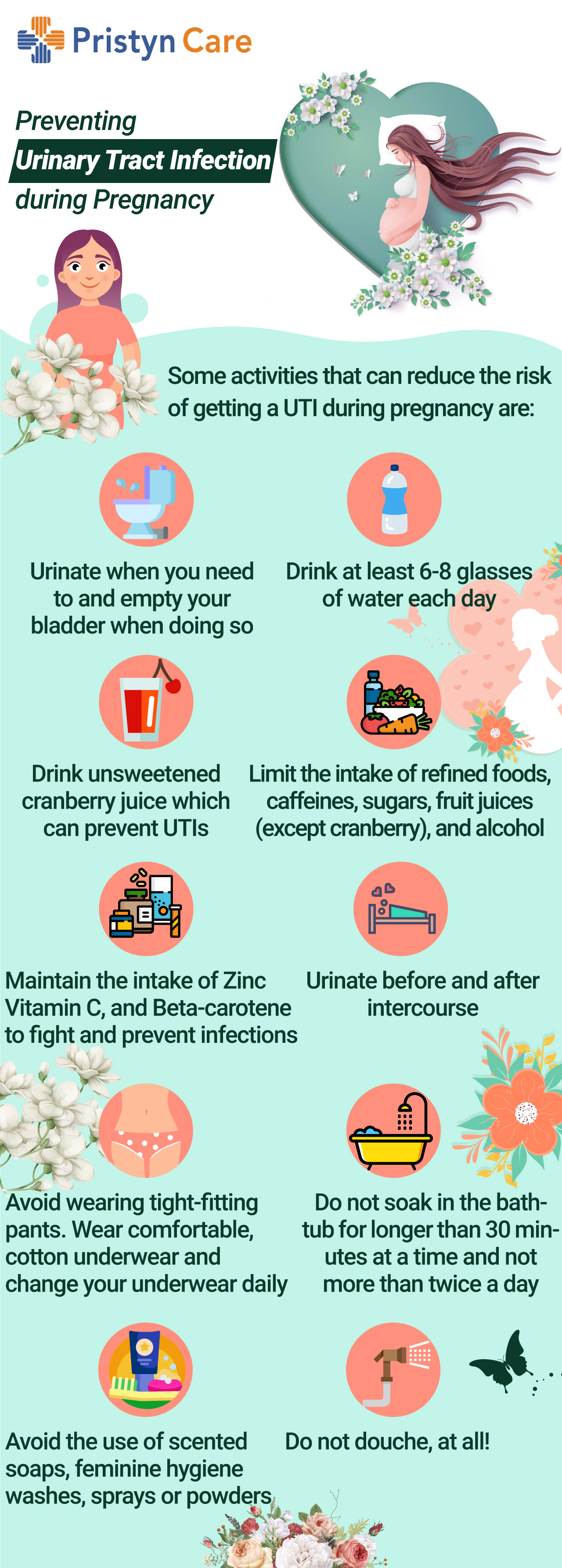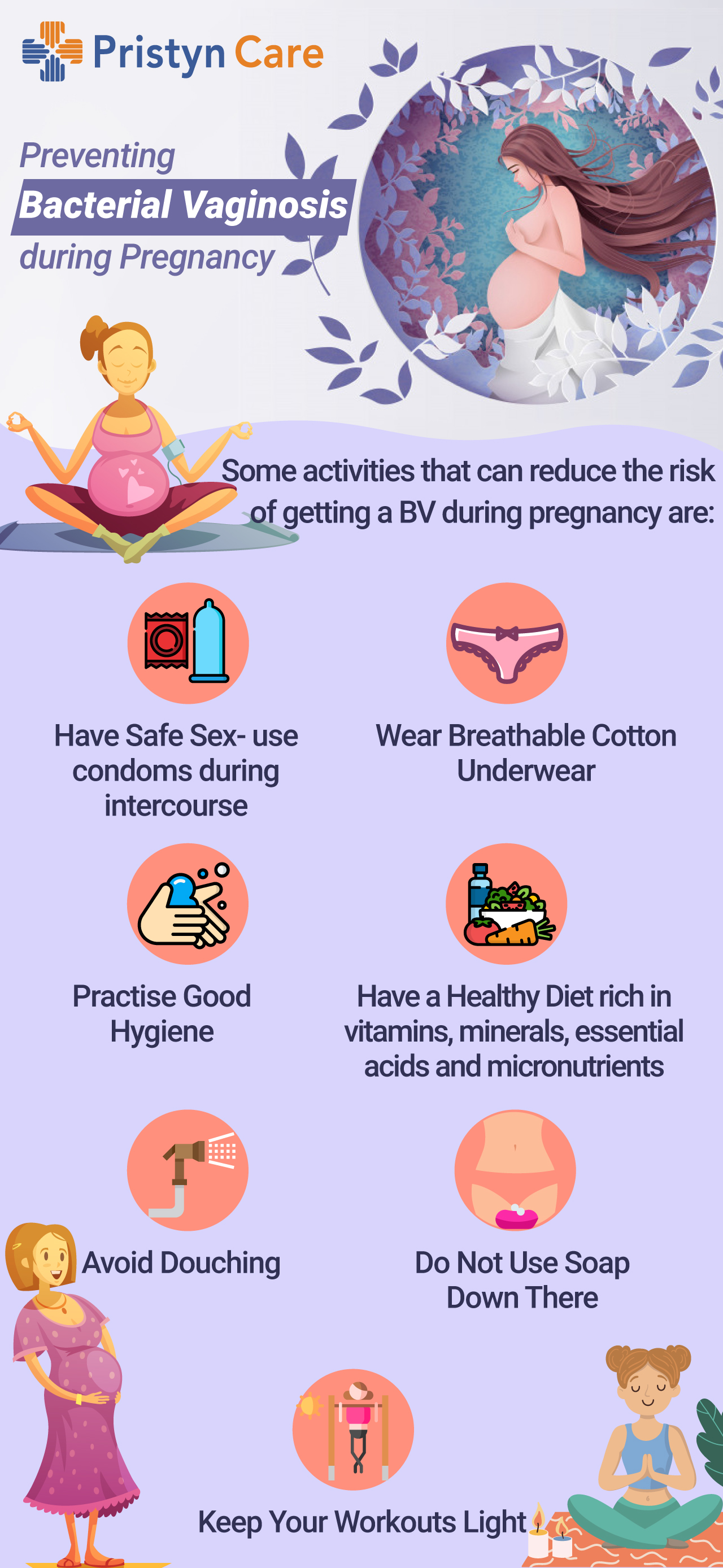
During pregnancy, the hormones change, which can leave the expecting mothers more prone to infections. Urinary tract infections or UTIs and bacterial vaginosis or BV are two most common complications a pregnant female may experience during pregnancy. Undiagnosed, mismanaged, or untreated, UTIs and BV can cause dangerous and even permanent birth defects or injuries, complications with pregnancy, and other health problems in the infant. Should you have any queries or case inquiries about BV or UTI during pregnancy, please contact the Pristyn Care team here.
Table of Contents
What are Urinary Tract Infections or UTIs?
A urinary tract infection or UTI is the infection in the body’s urinary system, including the kidneys, ureter, urinary bladder, and urethra. UTIs can either be in the form of lower tract infections such as bladder infections or upper tract infections such as pyelonephritis or kidney infections.
UTIs are the most common complications of pregnancy. Pregnant females are at an increased risk for such infections, especially between 6 to 24 weeks of gestation period. UTIs left untreated can lead to dangerous, serious permanent birth injuries and other pregnancy complications like premature birth, intrauterine infection, brain damage, or neonatal infection. (Also Read: How does a Woman Get a Urinary Tract Infection? )
Risk Factors For Urinary Tract Infections
Risk factors for UTIs include :
- Damage caused to the nerves (which control the urinary bladder) due to physical injury, multiple sclerosis, Parkinson’s disease, or other conditions.
- Obesity
- Sexual activities ( the risk is higher in young women)
- Former multiple pregnancies
- History of UTIs
- Prior urinary surgery
- Sickle cell disease
Preventing Urinary Tract Infections during pregnancy

Some activities that can reduce the risk of getting a UTI during pregnancy are:
- Urinate when you need
- Drink at least 6-8 glasses of water each day
- Drink unsweetened cranberry juice which can prevent UTIs
- Limit the intake of refined foods, caffeine, sugars, fruit juices ( except cranberry ), and alcohol
- Maintain the intake of Vitamin C, Zinc, and Beta-carotene to fight and prevent infections
- Urinate before and after intercourse (Also Read: Why you should never avoid cleaning your intimates after Sex? )
- Avoid wearing tight-fitting pants and underwear
- Wear comfortable, cotton underwear (Also Read: Underwear Rules you can Swear By for a Happy and Healthy Vagina)
- Change your underwear daily
- Do not soak in the bathtub for longer than 30 minutes at a time and not more than twice a day
- Avoid the use of scented soaps, feminine hygiene washes, sprays or powders
- Do not douche, at all!
Signs and Symptoms of Urinary Tract Infections
Symptoms of a UTI may include the following :
- Frequent need to urinate
- Pain or burning while urination
- Pain during intercourse
- A feeling of urgency while urination
- Cloudy or foul-smelling urine
- Mucus or blood in the urine
- Frequently waking up from sleep for urinating
- Pain, cramps or discomfort in the lower abdomen
- Fever, chills, or sweats
- Pain, pressure, or tenderness in the area of the urinary bladder
- Back pain, nausea, and vomiting ( this may occur if the bacteria spreads to the kidneys)
Complications of Urinary Tract Infections (UTI)
Mismanaged or untreated UTIs can cause serious and dangerous side effects and complications both for the baby and mother during pregnancy. The biggest risk here is that a UTI can also cause a kidney infection. During pregnancy, kidney infections are linked to low birth weight and early labor. The below-mentioned complications including birth injuries, obstetrical complications, and neonatal health problems can result from a mismanaged or untreated UTI:
- Intrauterine growth restriction (IUGR)
- Amnionitis ( infection of the uterus which can also spread to the fetus)
- Low birth weight
- Preterm birth ( birth of the baby before 37 weeks of gestation period)
- Preeclampsia and other high blood pressure (hypertensive) disorders of pregnancy
- Anemia
- Sepsis
What are the treatment options?
A pregnant female can help prevent UTIs during her pregnancy by doing the following:
- Empty your bladder whenever you feel the urge, especially before and after intercourse
- Wear comfortable cotton underwear
- Go Commando- Ditch your underwear at night
- Avoid douching, using perfumes, or sprays for intimate areas
- Drink plenty of water to stay hydrated
- Avoid using any harsh soaps or body wash in the intimate area
Most UTIs during pregnancy can be treated with a prescribed course of antibiotics. The doctor will prescribe a pregnancy safe antibiotic which will still be effective in killing off bacteria in the body.
What is BV or Bacterial Vaginosis?
Bacterial vaginosis or BV is the infection of the vagina caused due to an imbalance of normal bacteria or the pH balance of the vagina. Bacterial vaginosis is a common infection in females and affects approximately 10-30% of pregnant females. Mismanaged or undiagnosed Bacterial Vaginosis during pregnancy puts the baby at risk of being infected, brain damage, hypoxic-ischemic encephalopathy (HIE), cerebral palsy or developing sepsis, meningitis.
Risk factors for Bacterial Vaginosis
Risk factors for bacterial vaginosis are :
- Douching
- Multiple sex partners
- Sexual intercourse for young females
- Use of Intrauterine Contraceptive Devices ( IUD)
- Prior history of BV
Signs and symptoms of Bacterial Vaginosis
50% of females infected with bacterial vaginosis do not experience any symptoms. The most common symptom of BV is abnormal vaginal discharge, which may be gray or whitish in color and have a foul fishy odor.
Complications of Bacterial Vaginosis
Mismanaged or undiagnosed cases of bacterial vaginosis can lead to dangerous side effects or complications during pregnancy and is a threat for both the mother and fetus. The risk for women with bacterial vaginosis is preterm birth, which can bring out several other complications for the baby. The following complications can result from a mismanaged or undiagnosed case of bacterial vaginosis :
- Pelvic inflammatory disease (PID)
- Premature rupture of the membranes (PROM)
- Preterm birth (which can cause brain damage or cerebral palsy)
- Sepsis
- Low birth weight of the baby
- Perinatal death of the fetus
Prevention

- Have Safe Sex- use condoms during
- Wear Breathable Cotton Underwear
- Practise Good Hygiene
- Have a Healthy Diet rich in vitamins, minerals, essential acids and micronutrients.
- Avoid Douching
- Do Not Use Soap Down There
- Keep Your Workouts Light
Natural Remedies to Treat Bacterial Vaginosis
- Eat Yoghurt
- Take Probiotic Supplements
- Take Garlic Supplements
- Hydrogen Peroxide to clean the vaginal area
- Take apple cider vinegar baths
- Apply a mixture of tea tree oil, coconut oil, olive oil
How is Bacterial Vaginosis Treated?
Bacterial Vaginosis in pregnancy is mostly treated with antibiotics. Antibiotics for bacterial vaginosis in pregnancy may come as pills to swallow or as a cream to insert into the vagina. The doctor may prescribe the following antibiotics:
- Metronidazole, like Flagyl and Metrogel-Vaginal (can be taken orally)
- Tinidazole, like Tindamax (oral medication)
- Clindamycin, like Cleocin and Clindesse, ( topical medication to be inserted into the vagina)
Also Read:
- What are the Vaginal Infections and its types?
- Itchiness During Pregnancy? Here Are A Few Tips For Would-be Mothers







